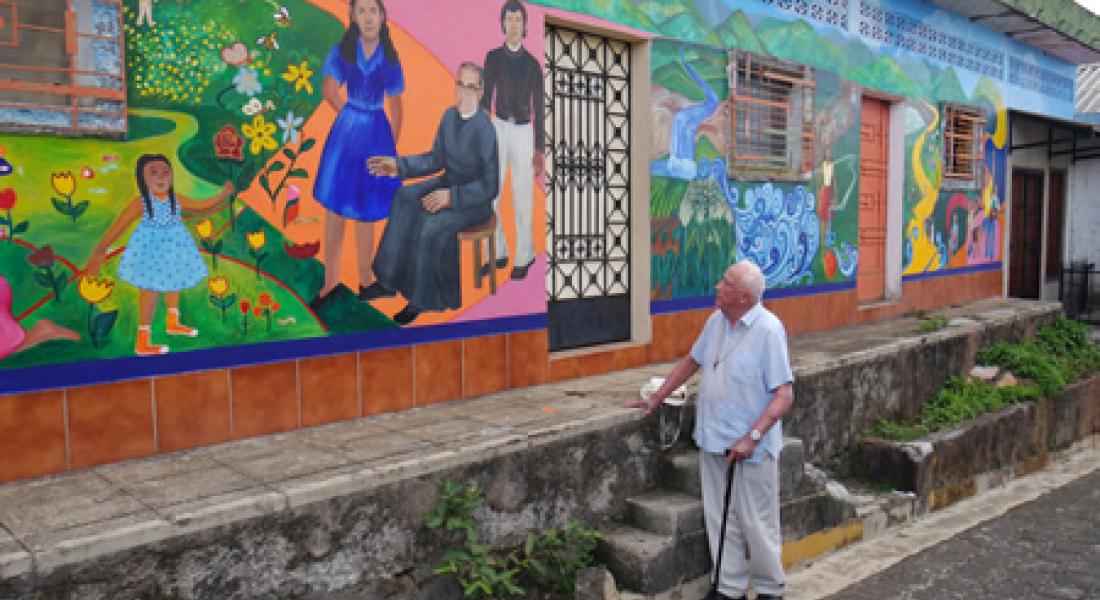
A Salvadoran priest who has been the focus of intense scholarship at the Kellogg Institute for International Studies was canonized Sunday, nearly four decades after he was assassinated by a right-wing death squad while saying Mass.
Oscar Romero was the archbishop of San Salvador and an outspoken advocate for civil rights and the poor when he was shot in 1980, as the country teetered on the brink of civil war. Today, he is closely associated with Latin American liberation theology, which advocates social and economic changes to alleviate poverty.
His canonization caps a decades-long push to declare him a saint, despite resistance from some who saw him as more of a politician than a priest or viewed liberation theology with skepticism.
Faculty Fellow Emeritus Rev. Robert Pelton, CSC (theology), 96, has spent his career studying Romero and traveled to Rome for the canonization. He called Romero “a wonderful pastoral example to the world.”
“I’m surprised how long it took to finally get to the truth about him,” he told The Guardian.
Faculty Fellow Emeritus Rev. Gustavo Gutiérrez (theology) told The New York Times in 2015, shortly before Romero’s beatification, that the priest was motivated by the poverty and suffering he witnessed, not by ideology.
“Monsignor Romero now appears to be understood, as he was also very misunderstood,” he said at the time.
Pelton is founder and former director of the University of Notre Dame’s Latin American/North America Church Concerns (LANACC), a program of the Kellogg Institute that hosts the annual Romero Days conference, the largest gathering of its kind devoted to studying the slain priest’s work. At this year’s conference, participants attended sessions on everything from agrarian reform and human rights to martyrdom and the connection between the Black Lives Matter movement and Romero’s legacy in the United States.
Pelton also produced the award-winning documentary Monseñor: The Last Journey of Oscar Romero, written several books about Romero, and edited Archbishop Romero and Spiritual Leadership in the Modern World (Lexington Books), a 2015 volume of essays that originated in a conference held at the Kellogg Institute the previous year.
According to the book, Romero expected to be murdered but showed that “by respecting transparency and with dogged perseverance, a nonviolent public leader can become an influential leader, even in times of the most savage repression and marginalization.”
One obstacle toward Romero’s sainthood was the Church’s requirement that someone be killed “in hatred of the faith” to become a martyr. Some argued that Romero had been killed for political reasons, not for his faith.
But, Pelton told the Catholic news agency Zenit, “it is impossible to separate ‘hatred for the faith’ from the political context where a martyr has died.” He said Pope John Paul II had broadened the Church’s understanding of martyrdom to encompass Romero, and Pope Francis later “unblocked” what had been a stalled canonization process.
In honor of Romero’s canonization, LANACC will hold a Mass of Thanksgiving on Oct. 23 at 5 p.m. in Dunne Hall, and a panel discussion about Romero on Oct. 24 in Jenkins Nanovic Hall, Room 1030A/B. Pelton will speak at the panel on “A Dream Come True: The Canonization of Oscar Romero,” and other sessions will examine Romero’s legacy among Latinos and “The Fittingness of Canonizing Oscar Romero and Pope Paul VI Together.”





